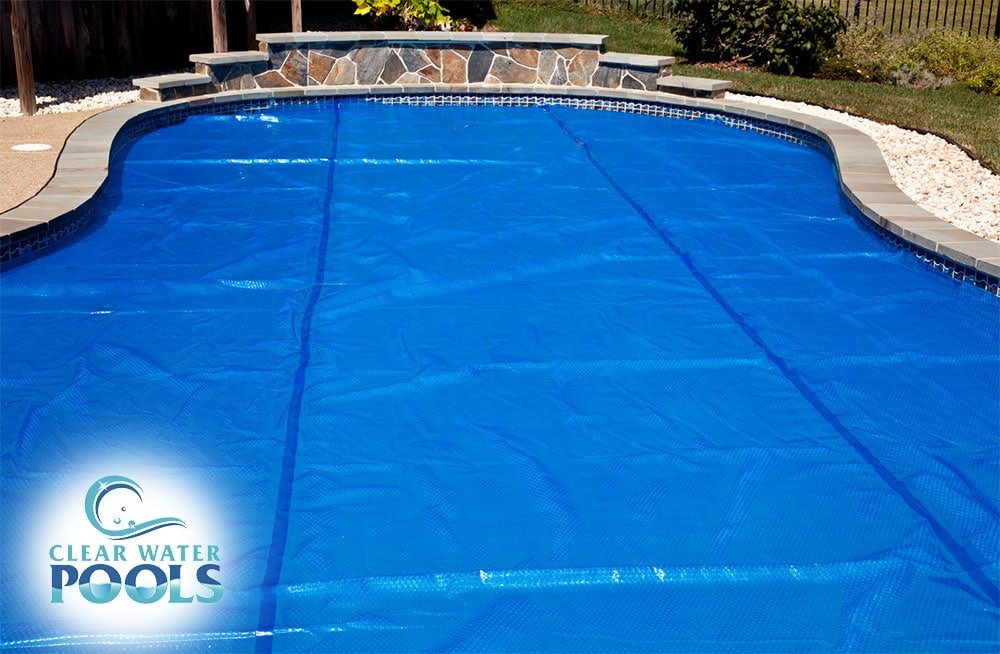Covers for Pools: What type of pool closing cover should I purchase for my pool?

As a homeowner, one of the routine tasks that you undertake before the onset of winter is preparing your pool for the off-season. The main part of this is procuring and installing a pool closing or cover. You can also do this at any time of the year when the pool will not be used for an extended period of time, or you can just cover it during the night.
There are several options that you can choose from, depending on your specific needs. While the most obvious reason to cover your pool when it is not in use is to keep out debris, pool covers serve a few other purposes as well.
Why do you need to install a pool cover?
While the main benefit of covers for pools is to protect them from debris like leaves, grass, and dirt of various kinds, they also help conserve water and energy.
- An average pool loses 20,000 to 50,000 gallons of water a year due to evaporation. In warmer and sunnier regions like Georgia, this loss of water is closer to the upper limit. By covering your pool with an opaque or solid cover, you can help reduce this rate of water loss. This is beneficial to the environment and you can reduce your utility costs.
- The more water your pool loses, the more you need to pump into it. As a result, your pool heater will need to stay on longer to effectively heat the pool. This will drive up your energy bills. A pool closing will help retain heat so that less electricity or fuel will be required to heat it to a comfortable temperature.
- A cover will help protect your family from dangerous mishaps. A sturdy cover will prevent small children or pets from falling in.
- A solid cover with no gaps can keep out rainwater that can turn the water murky. It keeps the pool free of bugs, dirt, and debris from vegetation. It also helps prevent the growth of algae and moss.
- Chlorine is regularly added to pools to keep the water clean. Ultraviolet rays from sunlight can degrade chlorine and render it ineffective. The supply of chlorine to the pool will have to be replenished more frequently, which will drive up maintenance costs. Especially in sunny cities like Atlanta, a cover will help keep out the sun and prevent this.
What are the different types of pool covers?
Standard winter cover: This type of cover is readily available in stores in a few standard sizes. It is the most economical option among covers for pools and is a quick and easy purchase. It consists of a tarp that is secured around the edges by a row of water bags. It serves the basic purposes of safety and blocking sunlight and debris. It is easy to install.
It is not as sturdy as the other options and can tear under the weight of water from a heavy downpour or an animal walking on it. It is made from waterproof material and so it tends to collect water which will need to be pumped out. It does not last very long and will have to be replaced after two or three winters. The water bags are not very durable either and will need to b replaced in a short time.
Mesh cover: This type of cover is made of a sturdy mesh with strong and taut interwoven fibers. It is securely anchored to the outside of the pool with spring-loaded straps. Despite being the most lightweight option, it can support a large amount of weight, in the range of several thousand pounds. It lets rainwater pass through, making it unnecessary to pump out or drain water from it. You can install it for the winter and leave it be till it is time to remove it for the summer. This makes it very low maintenance. It is very durable, giving it a lifespan of ten to fifteen years. This helps recoup the initial cost as it is not the most economical of options.
Since it allows rainwater to pass through, the water under it can turn murky and will need to be cleaned after it is removed. Since it allows sunlight to pass through, algae can grow in the pool, necessitating the frequent use of algaecide to prevent it. Since it does not block ultraviolet rays, frequent chlorine treatment is needed. An initial installation process is involved.
Solid cover: This type of cover is made of strong vinyl material. It is the most durable option as it can support a lot of weight, including large amounts of rainwater, snow, or heavy tree limbs. It does not allow water to pass through and keeps the pool water clean and clear. It protects your pool from fine debris that mesh covers may not be able to filter out. Since it blocks out sunlight and keeps the water free of debris in the fall season, algae growth is prevented. This is especially beneficial to Atlanta homeowners as fall begins early and it is still sunny at the time. It lasts for a good six to ten years, making it a worthwhile investment.
Solid covers need to be drained with a submersible pump as they collect water. They do not have as long a lifespan as mesh covers. An initial installation process and cost are involved.
Automatic covers: This type of cover is made of a variety of materials. It is very good as a solar cover. It keeps out sunlight and heat more effectively than the other options. They can be used to cover the pool during swimming season and at nights, keeping the pool free of debris all season long. This makes maintenance very easy. They are easy to operate as they are automatic. They also have an aesthetic, streamlined look.
They are expensive to install. They are made up of several mechanical moving parts that could malfunction, undergo wear and tear, need constant maintenance, and frequent replacement. They can retain heat so effectively that the pool water could heat up to an uncomfortable temperature.
Solar covers: This type of cover is mainly designed to insulate your pool and save on pool heating resources and costs. It drastically cuts down the solar evaporation rate and helps conserve water. Since it effectively blocks out sunlight and ultraviolet rays, it prevents algae growth and reduces chemical and chlorine use.
It floats on the pool and is not anchored, so it does not provide any safety. It needs frequent replacement.
In conclusion, once you decide whether your priority is safety, insulation, or cleanliness, it is a simple step to choose the right option for yourself. Some covers are more suited than others, for use in warm and sunny Atlanta. But whatever your choice, pool cover providers can help you install and maintain the right protection for your pool.




